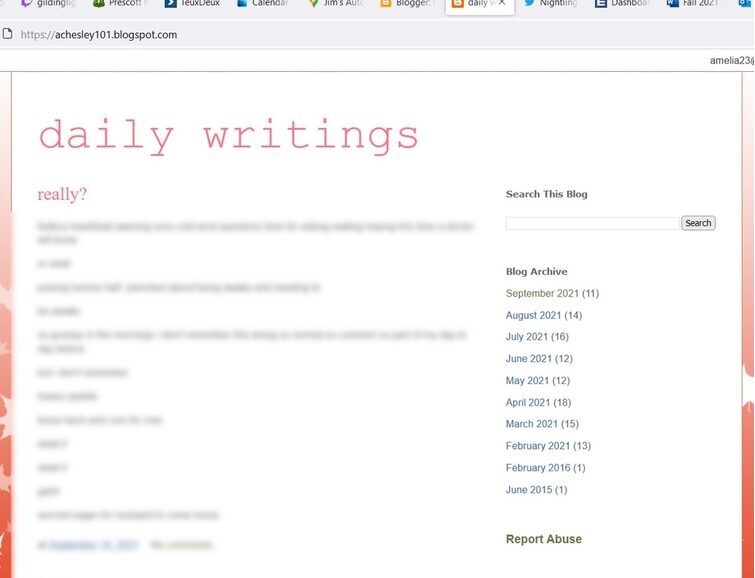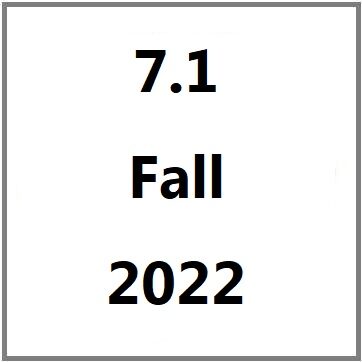daily writings
Amelia Chesley
Keywords: social media, therapy
Categories: Creatively Caring for Self, Others, and Place; Place-Making and Space-Taking on Social Media; Writing the Process of Writing
This year, finally, I’m learning to care for myself. I am learning and practicing and trying as much as I can to truly care for my whole entire self— not just put up with myself, not just do the bare minimum to keep going. Not just “enough so I can serve all the obligations and expectations swirling around outside of me” care.
This year, despite COVID, my partner and I bought a house. Three-bedroom, fenced backyard, huge garage. Caring for a house and a yard (as plain and relatively drought-proof as it is, here in north-central Arizona) is another new form of caring. So much space for us and two small pugs. A privilege and responsibility.
This year, despite COVID, I’ve been teaching in physical face-to-face classrooms, sharing space with dozens and dozens of students. As of this June, social distancing restrictions and masks and daily temperature checks have all been waived away. How well are we teachers and learners and university administrators caring for each other now? How well can we?
This year, after weeks on a waiting list and almost forgetting all about my need for a therapist, I started seeing an actually helpful therapist — one who does more than merely listen and nod and ask the occasional probing question. This therapist gives me homework. (Is it partly because I’m an academic that having therapy homework to work on feels so unassailably validating and right?)
This year, it is hard to know which barriers have been there all along and which stem more directly from this pandemic and all the havoc it is wreaking on society. Whichever the case, it’s all intertwined now anyway. Both types spur the others on, as if trying to find out how much more drastically worse they can each get.
This year, I tried a few times to quit the outrage- and envy-inducing whirlpool that is twitter. I took breaks every few weeks. I logged out and ignored it for a day or two at a time. But… even though I don’t use twitter very much as a platform for writing my own words, there are valuable conversations happening there. Academic twitter is a wondrous place, full of validation-trading and resource-sharing and idea-sparking. I’m grateful for its connections and inspirations; but even the cozy academic corner of my twitter feed can be overstimulating, draining, and triggering.
With everything going on in my head and heart this year, I had to try harder, at the very least, to give up twitter as a first-thing-in-the-morning habit.
When quitting twitter outright failed, I tried replacing it, somewhat successfully, with first-thing-in-the-morning daily blogging.
My first-thing-in-the-morning blogging routine is private. It's completely unpolished, typo-ridden, and messy. I started in February, right before we bought the house. Instead of taking my phone from its charging spot on the nightstand and opening my day with social media, I used that same gleaming screen to record snippets of my dreams, my emotions, my fears and goals and questions, observations, irritations... whatever felt real to me in the first moments of each day.

Using a smartphone and a blogging platform for this kind of journaling doesn't feel like proper journaling, not really. Part of me hates poking at the images of keyboard keys on a tiny little screen. It isn’t proper typing. It also doesn't give me the satisfaction of scrawling my own handwriting onto smooth, blank paper pages or of ritualistically marking down the day's date to begin each entry. I write plenty in physical notebooks these days too-- the kind that never could masquerade as portals into so many other people’s thoughts and feelings. The kind that have no power to push and prod me into an endless loop of endless scrolling. No—paper notebooks are gloriously simple. But no paper notebook—none so far—lets me write in it with only my fingers and nothing else. With this phone, there is no need for ink or pencil, no prerequisite to get out of bed or to make sure this particular pen works or to sit a certain way. It lets me write in the dark, before the sun comes up, without waking the sleeping husband or disturbing the sleeping pugs too much.
These benefits outweighed whatever unromantic downsides I might want to see in this kind of writing. It didn’t take long for this private blog to become a space for listening more carefully and consistently to myself. I was free in this space to rant and vent and unravel. To be worried and scared, or not. To be angry and hopeless, or not. To practice accepting all of it, without too much judgement or imagined peer pressure.
Four days into my new-habit-building writing exercise, on February 14, 2021, I wrote, “my own voice matters more right now than all the voices in twitter. i want to frame my day with my own perspectives.” I was craving simplicity, and this was a way to cultivate it.
Seven months later I can scroll (not so endlessly) through a digitally timestamped scrapbook. I wrote 100 times between February 10 and the end of August 2021. Not every day, after all, but perhaps enough. Revisiting that scrapbook of self-care snippets now, what do I find? Half-cryptic allusions to half-remembered life events. Attempts to capture in metaphors so many, many emotions, accompanied by so many scattered to-do lists. Thoughts recorded in fragments and rambling lines. I write about sleep a lot (half-worried that I’m sleeping too much, not getting enough done; especially grumpy when I wish I could sleep more). My persistent wrist pains—achey, cold, numb, in varying degrees—get mentioned pretty often. And there are also plenty of words about food. Food and hunger: constant, easy, alternating states of comfort. I never need metaphors for the feeling of hunger.
Writing in my own voice like this is care work. Writing and wordplay and messy sentence-building is so much of who I am that even half-asleep stream-of-consciousness writing that nobody else will ever see adds to the ways I can care for a precious part of myself.
This small commitment to a no-pressure, anything-goes moment of writing is self-validating, self-empowering, and self-soothing. It’s part of how I temper the sensory overload, corral my uncertainties and self-doubt, and remind myself that I am allowed to be angry and hopeless or sad for no reason, even if it feels like nobody else in the whole universe cares at all about those feelings. I can care. Maybe that can be enough.
My daily mini-blogging habit hasn’t totally supplanted my social media doomscrolling so far, but I think it has at least been an offset. A counterbalance. A small but significant shifting of priorities. Most days now I tune in to my own voice first, at least for a few moments, before I give in to the pull of everyone else’s voices.
Caring enough for myself seems hard, especially after most of a lifetime of believing it didn’t matter. It feels more difficult than it should—fraught with uncertainty and fear and internalized guilt. But among all the self-care, homemaking, teaching, and caring about the world stuff that seems so very difficult, this is one thing that doesn’t. Arranging words and metaphors to hold some of the wild snippets of my human experience is something I am good at. And doing more of that is good for me.
Posted by Amelia Chesley on September 15, 2021 at 5:44am
Bio
Amelia Chesley is currently an Assistant Professor of Professional Writing at Embry-Riddle Aeronautical University, teaching undergraduate courses in Technical Writing and Business Communication. In her research she engages with online communities, participatory knowledge-making, and multimodal accessibility for digital media. She loves all kinds of fiber crafts and records audiobooks with LibriVox when she can.
